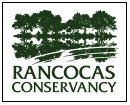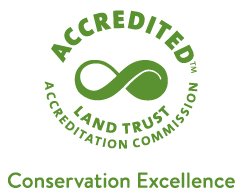Rancocas Conservancy works with landowners to design land preservation transactions that are a win-win for all. There are many methods to preserve land, including fee simple acquisition, conservation and agricultural easements, reserve life estate or remainder interest, and bequest. Each is briefly described below.
These land preservation techniques can be accomplished through a donation, bargain sale or sale for full value. A bargain sale is a sale at less than the appraised fair market value; donation is an outright gift for no financial remuneration. The Internal Revenue Service allows an income tax deduction for qualified conservation donations of either a part or the entire value of a property. Rancocas Conservancy strongly urges landowners to consult with their personal tax advisors regarding eligible deductions.
Fee Simple Acquisition
A fee simple acquisition by Rancocas Conservancy is the sale or gift of the property to our organization. Rancocas Conservancy becomes the owner of the land, which is restricted as permanent open space or farmland. In some cases, the land may be transferred to state or local governments, or nonprofit organizations, to further their open space or agricultural objectives.
Conservation and Farmland Easements
A landowner may donate or sell a conservation easement or farmland easement on his/her property. A conservation easement is a legal restriction that prohibits development of a property. It also restricts activities on the property that would have a negative effect on the natural characteristics of the property. These restrictions are usually tailored to each specific property and landowner. A farmland easement extinguishes development rights and limits the future use of the property to agriculture.
A conservation easement may include provisions for agricultural and recreational uses, and continuing single residential use by the property owner. A conservation easement may reduce the value of the property for inheritance tax purposes, enabling the land to remain in the family rather than be sold to pay the estate taxes. The land remains in private ownership and New Jersey Conservation Foundation or its partners are responsible for monitoring and defending the restrictions.
Reserved Life Estate or Remainder Interest
With a reserved life estate or remainder interest the land is transferred to New Jersey Conservation Foundation immediately and the owner reserves the use of the property for his or her lifetime. This allows the landowner to receive an income tax benefit during his or her lifetime, and removes the value of the property from the estate.
Bequest
With a bequest, the landowner conveys the property to Rancocas Conservancy at the time of his or her death through a will. This removes the value of the property from the estate for inheritance tax purposes.
Financial Benefits of Land Preservation
Land preservation benefits the landowner as well as his/her surrounding communities. For every single family home built, municipalities collect additional property taxes. However, the cost to provide utilities, roadways, police and firefighter services, education, and all of the amenities that we expect far exceeds the increase in tax revenue. Over-development is a financial drain on municipalities. Preserved open space and farmland requires few municipal services. With better planning for land preservation and focused development, municipalities might avoid sprawl, preserve the character of their community, provide recreation space for their residents and protect the water supply and air quality.
Landowners who preserve their lands may also derive a financial benefit. The landowner may be eligible to receive tax benefits by being able to deduct the value of a donation of land, or a donation of the development rights on the land, from his or her taxes for up to six years. A landowner who restricts development on his or her property by placing a conservation easement on the property may also reduce annual property taxes. Rancocas Conservancy strongly urges landowners to consult with their personal tax advisors regarding eligible deductions.


